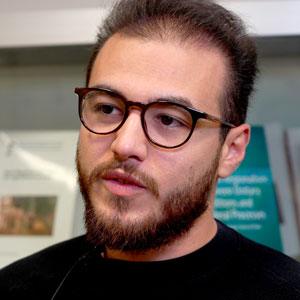Francesco Caturano
- GARR, Università di Napoli “Federico II”
- https://www.garr.it/
- http://www.unina.it/
9 ottobre 2019 - SESSIONE: Security: trend e applicazioni
 Docker Security Playground: un framework a microservizi per la realizzazione di scenari di attacco su infrastrutture di rete virtualizzate
Docker Security Playground: un framework a microservizi per la realizzazione di scenari di attacco su infrastrutture di rete virtualizzate

Docker Security Playground: un framework a microservizi per la realizzazione di scenari di attacco su infrastrutture di rete virtualizzate
 Borsista GARR e Dottorando presso il dipartimento di Ingegneria Elettrica e Tecnologie dell'Informazione dell'Università Federico II di Napoli. Laureato Magistrale nel 2018 con una tesi su "scoperta automatica di dispositivi IoT basati su CoAP" svolta presso Ericsson Finlandia. Attuale attività di ricerca a tema cyber-security, trattando temi di costruzione cyber-range, modellazione del comportamento dell'attaccante con tecniche di Intelligenza Artificiale e Generative Adversarial Networks.
Borsista GARR e Dottorando presso il dipartimento di Ingegneria Elettrica e Tecnologie dell'Informazione dell'Università Federico II di Napoli. Laureato Magistrale nel 2018 con una tesi su "scoperta automatica di dispositivi IoT basati su CoAP" svolta presso Ericsson Finlandia. Attuale attività di ricerca a tema cyber-security, trattando temi di costruzione cyber-range, modellazione del comportamento dell'attaccante con tecniche di Intelligenza Artificiale e Generative Adversarial Networks.
 GARR research fellow and PhD student at the Department of Electrical Engineering and Information Technology, Federico II University of Napoli. Graduated in 2018 with a thesis on "automated discovery of CoAP-based IoT devices" carried out at Ericsson Finland NomadicLab. Currently focused on cyber-security research activity, dealing with cyber-range construction topics, modeling of the attacker's behavior with Artificial Intelligence and Generative Adversarial Networks techniques.
GARR research fellow and PhD student at the Department of Electrical Engineering and Information Technology, Federico II University of Napoli. Graduated in 2018 with a thesis on "automated discovery of CoAP-based IoT devices" carried out at Ericsson Finland NomadicLab. Currently focused on cyber-security research activity, dealing with cyber-range construction topics, modeling of the attacker's behavior with Artificial Intelligence and Generative Adversarial Networks techniques.
Docker Security Playground: un framework a microservizi per la realizzazione di scenari di attacco su infrastrutture di rete virtualizzate
 Il tema della sicurezza informatica ha polarizzato l'attenzione pubblica sia nel mondo accademico che in quello aziendale negli ultimi 10 anni. L'aumento della quantità di dati personali che viene condivisa in pubblico comporta un aumento della sensibilità degli utenti verso il tema della privacy. Le aziende e gli enti di ricerca concepiscono la sicurezza come parte integrante di qualsiasi processo di design, una nuova prospettiva da cui poter inquadrare qualsiasi nuovo sistema. Inoltre, vi è un crescente interesse nel vedere le cose da un approccio "avversario", vale a dire, adottare la mentalità dell'attaccante allo scopo di progettare sistemi più sicuri. Presso la Federico II siamo sempre stati promotori dell'approccio "ethical hacking". Con questo spirito, illustreremo il design e l'implementazione di Docker Security Playground (DSP), un'architettura che sfrutta un approccio basato su microservizi al fine di costruire infrastrutture di rete complesse su misura per lo studio della sicurezza della rete. DSP è stato concepito come uno strumento per l'apprendimento della sicurezza della rete con un approccio "hands-on". Ad oggi, si configura a tutti gli effetti come un "designer" di cyber range, con un'interfaccia drag'n'drop che consente agli utenti di progettare infrastrutture di rete basate su container docker. Ciò si adatta perfettamente al contesto attuale, in cui i security operators hanno bisogno di ambienti virtuali isolati per sperimentare nuove soluzioni e formare nuove figure professionali. Descriveremo l'iter che va dalla creazione di un laboratorio interattivo, per poi mostrare come esso viene messo in esecuzione e condiviso con una comunità open-source ... tutto con l'approccio "hands-on" di cui siamo convinti. Sottolineeremo inoltre i vantaggi della gestione dei container docker rispetto alle macchine virtuali, oltre a evidenziare i limiti della virtualizzazione leggera e il modo in cui intendiamo superarli. Al termine presenteremo lo stato attuale di questo lavoro nato all'Università Federico II di Napoli e supportato da GARR, nonché le sue direzioni future.
Il tema della sicurezza informatica ha polarizzato l'attenzione pubblica sia nel mondo accademico che in quello aziendale negli ultimi 10 anni. L'aumento della quantità di dati personali che viene condivisa in pubblico comporta un aumento della sensibilità degli utenti verso il tema della privacy. Le aziende e gli enti di ricerca concepiscono la sicurezza come parte integrante di qualsiasi processo di design, una nuova prospettiva da cui poter inquadrare qualsiasi nuovo sistema. Inoltre, vi è un crescente interesse nel vedere le cose da un approccio "avversario", vale a dire, adottare la mentalità dell'attaccante allo scopo di progettare sistemi più sicuri. Presso la Federico II siamo sempre stati promotori dell'approccio "ethical hacking". Con questo spirito, illustreremo il design e l'implementazione di Docker Security Playground (DSP), un'architettura che sfrutta un approccio basato su microservizi al fine di costruire infrastrutture di rete complesse su misura per lo studio della sicurezza della rete. DSP è stato concepito come uno strumento per l'apprendimento della sicurezza della rete con un approccio "hands-on". Ad oggi, si configura a tutti gli effetti come un "designer" di cyber range, con un'interfaccia drag'n'drop che consente agli utenti di progettare infrastrutture di rete basate su container docker. Ciò si adatta perfettamente al contesto attuale, in cui i security operators hanno bisogno di ambienti virtuali isolati per sperimentare nuove soluzioni e formare nuove figure professionali. Descriveremo l'iter che va dalla creazione di un laboratorio interattivo, per poi mostrare come esso viene messo in esecuzione e condiviso con una comunità open-source ... tutto con l'approccio "hands-on" di cui siamo convinti. Sottolineeremo inoltre i vantaggi della gestione dei container docker rispetto alle macchine virtuali, oltre a evidenziare i limiti della virtualizzazione leggera e il modo in cui intendiamo superarli. Al termine presenteremo lo stato attuale di questo lavoro nato all'Università Federico II di Napoli e supportato da GARR, nonché le sue direzioni future.
Docker Security Playground: a microservices-based framework for the implementation of attack scenarios in virtualized network infrastructures
 The cybersecurity topic has polarized the daily conversation both in the academic and the business world over the last 10 years. The more the amount of personal data gets shared in public, the more privacy is perceived by general users as a major issue. Companies and research facilities are now persuaded that security should be part of any design process, a new perspective from which one can frame any brand-new system. Moreover, there is an increasing interest towards seeing things from an 'adversarial' approach, which means to adopt the mindset of the attacker in order to design more secure systems. At Federico II we have always been promoters of the "ethical hacking" approach. In this spirit, the presentation covers the design and implementation of the Docker Security Playground (DSP), an architecture leveraging a microservices-based approach in order to build complex network infrastructures specifically tailored to the study of network security. DSP has been conceived at the outset as a tool for learning network security with a hands-on approach. To this day, it has grown to the level of a full cyber-range designer, with a drag'n'drop interface that lets users design network infrastructures based on docker containers. This fits perfectly in the current trend, where security operators need isolated, virtual environments to experiment new solutions as well as train newcomers. We will go through the process that goes from the creation of an interactive lab covering multiple security aspects, to show how it is put into execution and shared among an open-source community...everything with the hands-on approach we are so fond of. We will also underline the advantages of running docker containers as opposed to classic VMs, as well as point out the limits of the light virtualization and how we intend to overcome them. At the end of the talk we will present the current state of this work born at University Federico II of Napoli and supported by GARR, as well as its future directions.
The cybersecurity topic has polarized the daily conversation both in the academic and the business world over the last 10 years. The more the amount of personal data gets shared in public, the more privacy is perceived by general users as a major issue. Companies and research facilities are now persuaded that security should be part of any design process, a new perspective from which one can frame any brand-new system. Moreover, there is an increasing interest towards seeing things from an 'adversarial' approach, which means to adopt the mindset of the attacker in order to design more secure systems. At Federico II we have always been promoters of the "ethical hacking" approach. In this spirit, the presentation covers the design and implementation of the Docker Security Playground (DSP), an architecture leveraging a microservices-based approach in order to build complex network infrastructures specifically tailored to the study of network security. DSP has been conceived at the outset as a tool for learning network security with a hands-on approach. To this day, it has grown to the level of a full cyber-range designer, with a drag'n'drop interface that lets users design network infrastructures based on docker containers. This fits perfectly in the current trend, where security operators need isolated, virtual environments to experiment new solutions as well as train newcomers. We will go through the process that goes from the creation of an interactive lab covering multiple security aspects, to show how it is put into execution and shared among an open-source community...everything with the hands-on approach we are so fond of. We will also underline the advantages of running docker containers as opposed to classic VMs, as well as point out the limits of the light virtualization and how we intend to overcome them. At the end of the talk we will present the current state of this work born at University Federico II of Napoli and supported by GARR, as well as its future directions.







